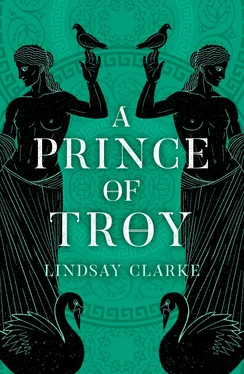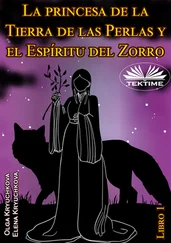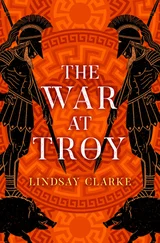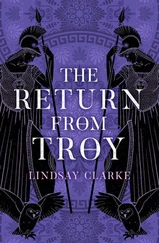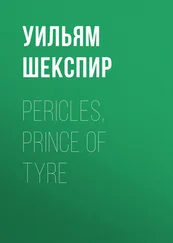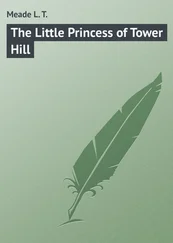‘But the boy lived,’ Odysseus said at last, filled with sympathy for the man who sat across from him, staring at the dying embers of the fire. ‘You have a son and heir.’
‘Whom I hardly know,’ Peleus answered, ‘and who knows nothing of me.’
‘That can be repaired. You can recall him from Cheiron’s school at any time.’
‘To live in this darkness with me?’
‘The child might lighten it.’
Sighing, Peleus searched the young Ithacan’s face. ‘Fortunately, it was prophesied that the boy will be a greater man than his father.’
Odysseus said, ‘Then he will be a great soul indeed.’
Warmed by the company of this new friend, Peleus asked Odysseus to stay with him in Iolcus for a time. The Ithacan gladly agreed and the two men talked often together, exchanging stories of former exploits and discussing the changes in the world now that Agamemnon, the son of Atreus, had reclaimed the throne in Mycenae and was expanding his power to such an extent that he must soon be acclaimed as High King of all Argos. They talked of lighter matters too and Odysseus had at last got his host laughing merrily one evening when the arrival of another visitor was announced.
As a bastard son of King Actor, Menoetius was loosely related to Peleus by marriage, and he had sailed around the straits from the Locrian city of Opus in search of help from him. Menoetius had a six year old son who was in trouble, having killed one of his friends when an argument over a game of knucklebones turned into a fight.
‘There’s no great harm in the boy,’ he said, frowning, ‘apart from his passionate temper. And it breaks my heart, but I can’t keep him with me in Opus. There’s blood guilt on him now, and the father of the boy he killed loved his son as much as I do mine.’
Peleus nodded. ‘So what are you asking of me?’
Menoetius asked if he might bring his son into the hall, and when permission was given, Peleus and Odysseus found themselves confronted by a scrawny six-year-old with a thick shock of hair and a downcast gaze firmly fixed on his own freshly scrubbed feet. Remembering how his own early fate had been shaped by the death of another, Peleus said, ‘What’s your name, boy?’
Briefly the small face glowered up at him in sulky defiance, then immediately looked down again, saying nothing.
‘His name’s Patroclus,’ Menoetius said, ‘though, as you see, he hasn’t brought much glory on his father so far.’
‘There’s still plenty of time,’ Odysseus put in lightly.
Menoetius looked back at Peleus in appeal. ‘I hear that you’ve sent your own son to the Centaur?’ When Peleus nodded again, he added. ‘I was wondering if you thought he might be able to sort this boy out.’
‘He sorted me out,’ Peleus said quietly.
‘But that dreadful business at the wedding of Pirithous … when they got drunk …’ Menoetius saw Peleus frown. He hesitated and began again. ‘I mean, weren’t you already a man when you went to Cheiron.’
‘I was more of a man when I came away. As were Pirithous and Jason, though they were sent to him as boys. And I might have been a better man still if I’d stayed among the Centaurs.’ Peleus shook his head. ‘But that was not my fate. As it is, I was glad to send my son to Cheiron. And since then a number of my Myrmidons have done the same.’ He turned back to where Patroclus shifted uneasily on his feet. ‘Look at me, boy.’ Grimly, Patroclus did as he was bidden. ‘Would you like to hunt and learn how to talk to horses? Would you like to know the magic locked in herbs, and how to sing and finger the lyre so that the animals come out of the trees to listen?’
Uncertainly Patroclus nodded.
‘I think I’d like to go to this school myself,’ Odysseus smiled.
Astounded by himself, Peleus said suddenly, ‘Then come up the mountain with me tomorrow.’
Odysseus looked up, surprised at the transformation in his friend. Some god must be at work here. He felt the hairs prickle at the nape of his neck. But he smiled and nodded. Why not? Yes, he would be glad to go.
Peleus turned back to Menoetius. ‘It’s time I went to see how my own son’s doing. You’ve done the right thing. Leave your boy with me.’
Apart from a tree that had been struck by lightning and the number of scruffy children to be fed, Peleus found the gorge hardly changed since the last time he had been there. But Cheiron felt much older, his cheeks were hollower than Peleus remembered, and the wrinkles deeply pouched about his eyes. His movements were slower too, though he was still limber, and his hands trembled as he offered a libation of mare’s milk in thanksgiving for the return of his son and friend. He welcomed Odysseus warmly among his people, and smiled kindly at Patroclus, questioning him a little, before packing him off to play with some of the other children by the stream. A boy was sent to search for Achilles in the woods and, as they walked to the cave, Peleus explained why Patroclus had been sent to him. But Cheiron merely nodded in reply, and then shook his head over the way Peleus was limping across the rocks. ‘You should have come to me sooner,’ he said, ‘then as now.’
As they ate together, Odysseus expressed his admiration for Cheiron’s way of life. ‘We still like to keep things simple on Ithaca,’ he said. ‘Some people find us rude and barbarous, yet we’re honest and we have all we need there. It’s only a restless lust for adventure that draws me away, but I’m always glad to get home again.’
Peleus sighed. ‘I should never have left this place.’
‘A man must follow his fate,’ Cheiron said, ‘and yours has been a hard one. I should have seen it sooner, but there are things the heart sees and will not believe.’ Peleus insisted that none of the blame for his fate had been Cheiron’s, but the old king gravely shook his head. ‘Though she followed her mother’s ways, Thetis is of my blood, and I have failed as a father.’
When Odysseus protested that Cheiron had been a good father to many of the greatest heroes of the age, the old Centaur sighed that a man could care well for the children of others yet be a fumbler with his own. ‘It is only boys who come to me here,’ he said, ‘and though the power in the world may have passed to Sky-Father Zeus, the Goddess still has her claims to make on us – though sometimes it is hard for men to understand her mysteries.’ He gazed up into the troubled eyes of Peleus and drew in his breath. ‘But you have a fine son. He’s already a skilful huntsman and he runs like the wind. Also he has a singing voice that will break your heart. You will be proud of Achilles – as he is already proud of you.’ Cheiron took in the dubious tilt of Peleus’s head. ‘Oh yes, he knows that his father is a great king in Thessaly and has already taken a knock or two for bragging of it.’
At that moment all three men heard the eager, rowdy sound of boy’s voices shouting in the gorge. They tried to resume their conversation, but the noise went on until Cheiron got up and said, ‘It’s time I put a stop to it.’
His guests followed him to the mouth of the cave where they looked down at the sward of rough grass among the rocks and saw two boys scrapping like fighting dogs inside a shifting circle of young, tousle-headed spectators who were urging them on. When they struggled back to their feet from where they had been flinging punches at each other on the ground, blood was bubbling from both their noses.
Peleus recognized Patroclus by the dark red tunic he was wearing. ‘His father warned me that he had a bad temper, but this is a poor start. I trust the other fellow is strong enough to stand up to him.’
‘I should think so,’ Cheiron turned to him and smiled. ‘He is your son.’
Читать дальше
